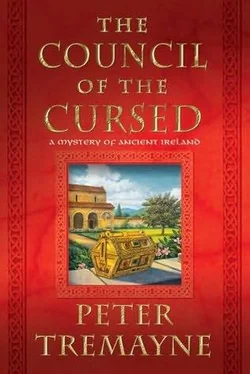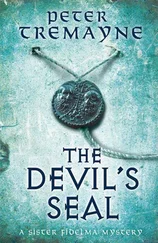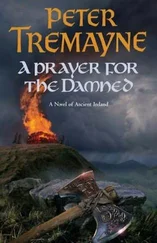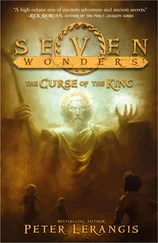Peter Tremayne - The Council of the Cursed
Здесь есть возможность читать онлайн «Peter Tremayne - The Council of the Cursed» весь текст электронной книги совершенно бесплатно (целиком полную версию без сокращений). В некоторых случаях можно слушать аудио, скачать через торрент в формате fb2 и присутствует краткое содержание. Жанр: Исторический детектив, на английском языке. Описание произведения, (предисловие) а так же отзывы посетителей доступны на портале библиотеки ЛибКат.
- Название:The Council of the Cursed
- Автор:
- Жанр:
- Год:неизвестен
- ISBN:нет данных
- Рейтинг книги:4 / 5. Голосов: 1
-
Избранное:Добавить в избранное
- Отзывы:
-
Ваша оценка:
- 80
- 1
- 2
- 3
- 4
- 5
The Council of the Cursed: краткое содержание, описание и аннотация
Предлагаем к чтению аннотацию, описание, краткое содержание или предисловие (зависит от того, что написал сам автор книги «The Council of the Cursed»). Если вы не нашли необходимую информацию о книге — напишите в комментариях, мы постараемся отыскать её.
The Council of the Cursed — читать онлайн бесплатно полную книгу (весь текст) целиком
Ниже представлен текст книги, разбитый по страницам. Система сохранения места последней прочитанной страницы, позволяет с удобством читать онлайн бесплатно книгу «The Council of the Cursed», без необходимости каждый раз заново искать на чём Вы остановились. Поставьте закладку, и сможете в любой момент перейти на страницу, на которой закончили чтение.
Интервал:
Закладка:
He paused. Eadulf was looking uncomfortable.
Fidelma regarded Abbot Cadfan in sympathy.
‘Over a thousand of your brethren killed, you say?’
‘Of religious brothers and sisters,’ confirmed Cadfan. ‘It was an unprovoked attack by the Saxons.’
‘The ambition of Wulfhere to rule over all the Saxon kingdoms is well known,’ Eadulf observed slowly. ‘He also claims to be Bretwalda, that is lord over the Britons. He persuaded the authority of the archbishop at Canterbury to recognise that title. His alliances and conquests now hem in my own people, those of the kingdoms of the East Angles. He controls the kingdom of the East Saxons and also the kingdom of Lindsey to the north of us.’
‘You’ll forgive me if I am more concerned with my own people,’ Abbot Cadfan replied dryly. ‘It is Wulfhere’s attempts to destroy us that are on my mind. I asked Ordgar, as a man of Christ, representing the new bishop sent by Rome to administer to the Saxon kingdoms, if he would join me in condemning this sacrilege and unprovoked attack on a religious house. The man laughed in my face and said he rejoiced to hear of the success of Wulfhere’s exploits.’
Eadulf dropped his gaze to the floor and was now clearly embarrassed.
‘There has been continual warfare between your people and mine,’ he offered, feeling he should make some comment.
Abbot Cadfan’s expression was controlled. ‘Why is that, Brother Eadulf? Did we invade your lands or did you invade our lands? Surely, you are too intelligent to blindly side with your people when they are in the wrong?’
‘So,’ interrupted Fidelma hastily, ‘Bishop Ordgar refused to condemn the destruction of Benchoer. What happened then?’
‘We went into the council and before I had a chance to raise the matter, Ordgar began to insult me; this led to an argument and the council was adjourned. As we were leaving, Ordgar insulted me once again. Alas, it is my great fault that I am cursed with a quick temper. Losing it, I struck Ordgar and he struck back-and the next thing I knew, we were wrestling on the floor. It was unforgivable and undignified. Then the brethren were pulling us apart.’
‘When was this?’ asked Fidelma. ‘I mean, when was it in relationship to the events in Ordgar’s chamber?’
‘It was the very same afternoon.’
‘So tell me what happened after you and Ordgar were forcibly split up?’
‘I decided to avoid him and went with one of the Gaulish brethren to see that ancient Roman theatre which is not far from this abbey. It is an amazing place and-’
‘We have seen Roman theatres,’ Eadulf pointed out, observing the enthusiasm in the man’s eyes and wishing to keep to the matter in hand.
‘Not an amphitheatre like this, that seats fifteen hundred people. It is-’
‘Did anything of relevance happen at the theatre?’ interrupted Fidelma quickly. ‘Is this why you mention it?’
‘No.’ Realising that he should stick to the important facts, the abbot went on, ‘We returned here for evening prayers. I saw Ordgar in the chapel but again, avoided him, then came here to my chamber and retired for the night. I was awoken by a tapping on the door. I called out, but there was no answer. It was still dark but I felt it was not long before dawn. I lit a candle, but when I went to the door, the corridor was empty. However, there was a note on the threshold. A scrap of parchment.’
‘What was on it?’ asked Eadulf.
‘It bore the name of Ordgar and said that he was at great fault and wished to see me at once. That he would be waiting in his chamber for me.’
‘We were told that you no longer have this note,’ Fidelma said.
‘I had it on me when I went to Ordgar’s chamber, but when I recovered consciousness it was gone,’ explained Abbot Cadfan.
‘I see. It said nothing else?’
‘Nothing.’
‘Did you not think it was strange-to receive such a note at such an hour?’
Abbot Cadfan glanced at him with a frown. ‘In what way strange?’
‘That Bishop Ordgar, after the encounters you had had with him, should suddenly send you an apology and invitation at such an hour?’
The Briton shrugged. ‘Paul encountered a blinding light on the road to Damascus,’ he replied. ‘Why not Ordgar in the middle of the night?’
‘I doubt whether even Paul had the disposition of Ordgar,’ observed Fidelma softly.
Abbot Cadfan thought for a while and then said: ‘When I consider it in hindsight, then perhaps it was strange. I suppose that I was concerned with letting Christendom know of the crime at Benchoer. So I went eagerly to his chamber. I thought he had truly changed his mind. And now the note has vanished, which makes me appear a storyteller.’
‘What then?’
‘I tapped on the door and it swung open so I went inside. It was dark and I called out. Then there was a split second of pain. I think I knew that I had been struck from behind. The next thing, I was back here on my own bed. Someone had bandaged my head, which was painful and bloodied.’ He raised a hand to his head. ‘There is no bandage now, but you may still see the scar and the faint bruise that still exists.’
‘Were you told of what had happened?’
‘I was told that Abbot Dabhóc was dead, that I had been found unconscious and that Ordgar was claiming that he had been drugged. I was also told that the physician Brother Gebicca had brought me back to my chamber and tended me. Then the next day, Bishop Leodegar informed me that Ordgar was accusing me of contriving this murder in order to put the blame on him. It therefore seemed obvious to me who the culprit was. I say it was Ordgar who was waiting behind the door to strike me down as I entered.’
Fidelma was puzzled and said so.
‘I do not follow your logic here, Abbot Cadfan. How do you reach this conclusion?’
‘Easy enough. I met Abbot Dabhóc at the council. Why would I kill him? He was sympathetic to me, and the people of Iwerddon, as we call your country, share many of our rites and rituals. Whereas Saxons do not. I had no reason to argue with Abbot Dabhóc. The accusation Ordgar levels at me is false. He disliked Abbot Dabhóc as much as he disliked me. I say that Ordgar arranged the whole thing to put the blame on me . It is as simple as that.’
There was silence for a moment. Then Abbot Cadfan regarded Eadulf as if a sudden thought had occurred to him.
‘Didn’t I hear that you, Brother Eadulf, went to one of those schools for physicians that are renowned in Iwerddon?’
‘I went to Tuam Brecain,’ Eadulf acknowledged.
‘Excellent. Now, please, examine my head. Look at the wound on my scalp and the bruises.’
Eadulf rose and went to examine the abbot’s head.
‘I can see a jagged cut running from a line just above the left ear,’ he reported. ‘It is healing well but was fairly deep, I would say. There is still bruising all around. I would guess that it was inflicted by a blunt instrument.’
Abbot Cadfan gave him an approving look.
‘You have a discerning eye, Brother Eadulf. I will not argue with your finding. So tell me, how did I, having drugged Ordgar and killed Abbot Dabhóc, then inflict this wound on myself? A wound on the back of my head that knocked me unconscious for many hours.’
‘It would be difficult,’ Eadulf conceded, rubbing his chin thoughtfully. ‘But perhaps Dabhóc inflicted the blow just as you killed him, or else you had an accomplice?’
‘You disappoint me,’ Abbot Cadfan replied, still cheerful, ‘I would say it was impossible to exert that much power with the one hand I would have had free to use. Can you imagine me picking up a piece of wood and attempting to strike myself on the back of the head?’ He laughed. ‘As for Dabhóc inflicting the blow, that is out of the question. Don’t take my word for it-ask Brother Gebicca. And once struck, I would be incapable of summoning enough strength to kill him. As for an accomplice-who would be my accomplice?’
Читать дальшеИнтервал:
Закладка:
Похожие книги на «The Council of the Cursed»
Представляем Вашему вниманию похожие книги на «The Council of the Cursed» списком для выбора. Мы отобрали схожую по названию и смыслу литературу в надежде предоставить читателям больше вариантов отыскать новые, интересные, ещё непрочитанные произведения.
Обсуждение, отзывы о книге «The Council of the Cursed» и просто собственные мнения читателей. Оставьте ваши комментарии, напишите, что Вы думаете о произведении, его смысле или главных героях. Укажите что конкретно понравилось, а что нет, и почему Вы так считаете.











